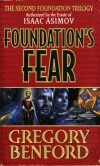The Second Foundation Trilogy is a venture initiated by Asimov’s Estate. Gregory Benford was approached to work on the project, and eventually Greg Bear and David Brin finished the series. I remember from my previous experience with Foundation’s Fear back in 2000 or so that I didn’t like it. I made a point of keeping track of details that bugged me throughout the novel so that I could provide some constructive criticism. I tried to do my best to keep an open mind, but it wasn’t long before I remembered why I didn’t like this novel. There will be minor spoilers, but hopefully they will help you save some time reading this 597 page (paperback) monster.
- Worm Holes: There is a vast network of wormholes that appears to be part natural and part artificially created and maintained which links the Empire together. This is completely new concept which is added, apparently from out of the blue. Where were these worm holes in the rest of the series by Asimov? Benford makes no attempt to reconcile this inconsistency. Asimov himself would always apologize after the fact after technologies or theories he integrated where found to be impossible, but I don’t see why there is a need to ADD technology a series that is so well established.
- Tiktoks: robots with simple minds are used for labor. These are not seen or mentioned by Asimov at this point in the timeline. Mechanical beings are taboo. Benford makes the leap and associates the taboo only to the mental function, to the appearance. I don’t think Asimov would have approved.
- Sims: I was bugged by the Joan of Arc and Voltaire sim story arc the first time I read this, and this hasn’t changed. Sims are also taboo in the same category as Robots. Essentially 150-200 pages are dedicated to character exposition for these two sims and the question of whether digital life is ‘alive’ or posses souls. I’ve seen reviews that suggested the novel is much better by just skipping this section, and I’d have to agree. If you like theological dialogue which has no real bearing on the overall story, go right ahead and read it.
- Panucopia: This section is approximately 100 pages, but I think that the ideas could have been presented much more concisely. However, this was probably the fastest 100 pages of text throughout the whole novel. Benford definitely kept me interested, as I read the whole section in one sitting, which is unusual for me especially for this novel.
- Errors: Dors Vanabili should be spelled Venabili. If you are continuing the works of a grand master such as Isaac Asimov, at least double check the character names! This reminds me of Mark W. Tidemann’s switching of Ariel Welsh (formerly Katherine Burgess) to Ariel Burgess in Mirage.
- Everything Else: There is new technology constantly being introduced and overly explained throughout the book. It was only about page 30 or so that I noted this first. It makes the Empire seem much more advanced and not as much in decline.
- Other: There are several other spoiler filled inconsistencies which bug me, but I won’t list. The fact that Benford doesn’t try reconcile these new ideas is the main thing that bugs me.
In general, the book reads very slow most of the time. Aside from the Panucopia section, I rarely read more than a few chapters at a time without breaking it up with some other activity. The novel begins right after Cleon I announces he wants Hari Seldon for First Minister. The rest of it involves the many assassination attempts on Hari and his attempt to win over the council so that he can be approved as First Minister. Intertwined between these adventures Hari tries to advance his understanding of psychohistory through technology ranging from ancient personality sims, immersion in primitive beings, and virtual reality.
As I’ve said earlier, much of the technology is explained to the point of tedium, and much of it can be skimmed over. As a completist for this project, I forced myself to read this again, but I doubt I will ever return to it now that I have my notes and personal review completed. I can only recommend reading this with attention paid to what can be skimmed, as it forms the foundation (sorry bad pun there) for the next two novels in the series. From what I remember, and other reviews they are far better than the first of this series.


I am a fan of Benford’s, Timescape was the first of his novels that introduced me to his writings. However, ‘commissioned’ work seems not his forte; delving into the foray of Asimov’s Foundation-verse filling-in the gaps of the Seldon story poses a question whether anyone needed in the first place.
I tried to decide what route did he wanna go throughout the book; it seems that’s a thing that Benford struggled to answer it hiimself: Foundation’s Fear during/upon reading feels like a pastiche of Dan Simmons’ Hyperion, some William Gibson for good measure, bit of Avatar (albeit the book came out much earlier than the movie) and then some of Asimov stuff mainly in protagonists’ names only.
True to form, Benford states in the book’s Afterword that he tried to explore ideas in the Foundation series not touched or barely hinted at by Asimov, so in essence he wrote a Benford book set in the Foundation universe, rather than writing an Asimov style book piece. And as such, it works well.
However, to me, plot-wise the book doesn’t further any more in-depth progression of the Foundation mythos. Honestly it felt boring at moments.
Long time fans of the Foundation series could skip this freely without fear of missing any piece already included in the previous or subsequent Foundation books.